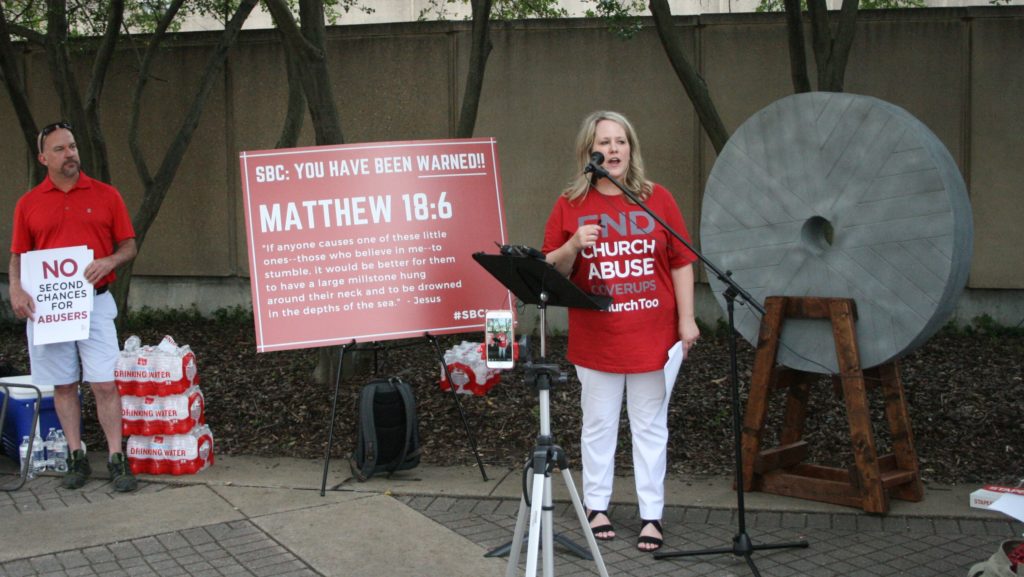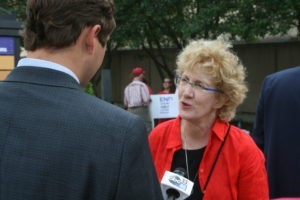While Southern Baptist Convention messengers inside the Birmingham Jefferson Convention Complex took first steps to punish churches that enable sexual abuse, survivors relegated to a sidewalk outside the meeting hall demanded a system to make it harder for clergy predators to move from church to church.
“You may force us to meet on street corners, but mark my words, we will not be silent,” abuse survivor and advocate Ashley Easter addressed SBC leaders in absentia at the second annual For Such a Time as This rally June 11.
The rally began moments after the denomination amended governing documents to clarify that churches indifferent to sexual abuse are not “in friendly cooperation” with the convention and to empower a standing committee to discern whether individual churches meet membership requirements, a responsibility now before the SBC Executive Committee.
Protesters outside the convention hall said they want more: establishment of a database to track and warn about known predators, mandatory training to recognize and address abuse and repudiation of a “low view of women” they say contributes to a culture of abuse.

Cheryl Summers
“We have seen some progress, but there is a lot more work to be done,” said rally organizer Cheryl Summers.
“One year ago we held the first For Such a Time as This rally in Dallas,” Summers said. “One year ago there was no sexual abuse study group, and it exists today. One year ago training about abuse in the church did not exist for Southern Baptist churches, and this week the new Church Cares training protocol will be unveiled. One year ago Paige Patterson, the poster child for mishandling abuse disclosures, was scheduled to give the keynote address at the annual meeting. That never happened because people stood up and spoke up.”
“We will continue to speak for those who imagine they are the only ones living a private nightmare,” she said. “We will continue to speak because well-meaning pastors just don’t know what they don’t know, and they do tremendous damage to survivors.”
Christa Brown, an abuse survivor who has been calling for change in the Southern Baptist Convention’s abuse policy for 13 years, said her story is “dreadfully common.”
“Almost every Baptist survivor I have ever spoken with has said that the trauma from the institutional betrayal far exceeded the trauma from the abuse itself,” Brown said. “This massive institutional enablement of horror must be addressed on an equally massive scale.”
“The path forward is a database, an independently administered database of Southern Baptist clergy, those criminally convicted, those who have admitted to conduct constituting abuse and those who are credibly accused as determined by an independent panel,” Brown said.
“Many others are now urging the same thing,” Brown said. “It is so obviously what is needed, and yet the SBC still balks.”

Christa Brown talks to local media prior to the start of Tuesday’s For Such a Time as This Rally. (Photos by Bob Allen)
“So here’s what I want to know,” she continued. “How many kids will it take? Seven hundred victims documented by the Houston Chronicle and San Antonio Express-News. Three hundred and fifty more who have contacted them since then. Thank God for the Houston Chronicle and San Antonio Express-News.”
“How many kids could have been spared if SBC officials had taken action back in 2006 when a database was first proposed?” she wondered. “It’s been 13 years, and how many more kids will it still take before this convention will do what other faith groups do and at least begin keeping records on credibly accused clergy sex abusers. How many kids?”
David Clohessy, former head of an advocacy group that decades ago pushed for similar reforms in the Roman Catholic Church, described Brown as the “Rosa Parks of the Protestant child safety movement.”
“Just like Rosa Parks and other pioneers and social movement leaders, Christa has endured all kinds of persecution and harassment,” said Clohessy, former national leader of the Survivors Network of Those Abused by Priests. “It was literally 10 years ago that a top Baptist official, Paige Patterson, said of Christa and others who were pushing for change, said they were just as reprehensible as sex criminals.”
“That tells you something about the mindset that we’re up against,” Clohessy said.
Clohessy, an abuse survivor who testified before the U.S. Conference of Catholic Bishops in 2002, said denominational policies, procedures and protocols regarding sexual abuse exist for two reasons: legal defense and public relations.
He also advised advocates to do something counter-intuitive, ignore church officials who promise to do better in the future.
“Continue to create external pressure,” Clohessy said. “Criminal prosecution, civil lawsuits, exposing wrongdoers in public, reforming archaic predator-friendly laws, that stuff works.”
“It’s possible that sitting around talking with church officials we might be able to change them over time, but guess what, kids are being raped today,” Clohessy said.
Clohessy said another thing that works is “making heads roll.”
“It may sound harsh,” he said. “It may sound punitive. It may sound unchristian, but the simple fact is nothing changes human behavior like consequences for wrongdoing. And wrongdoing that is ignored is wrongdoing that is encouraged.”
“When some of these men – not just those who commit but those who conceal abuse – when they start being demoted and defrocked and disciplined and denounced, that’s when change really happens,” Clohessy said.

Brooks Hansen
Survivor Brooks Hansen quoted Martin Luther King’s famous saying, “Justice too long delayed is justice denied,” comparing Southern Baptist leaders today to the eight white pastors whose public concern about tactics of civil-rights protestors prompted King’s 1963 Letter from Birmingham Jail.
“I’m tired of justice being denied to victims of abuse and their families,” Hansen said. “King’s prophetic words must be heeded.”
“Even this week For Such a Time as This organizers were rebuked for a lack of thankfulness and gratitude for the progress that’s been made so far and a need for greater patience moving forward, but they say, yet again, wait.”
“I hear never,” Hansen said. “I stand here today not for myself but for the young teenager who is walking in the same shoes that I wore in 1998. I’m here after years of being silenced, relegated to a street corner and speaking loudly for the thousands of others that have had their stories and voices taken away from them.”
Today SBC messengers will vote on a non-binding resolution “on the evil of sexual abuse.” It marks the fourth SBC resolution on the topic since 2007.
“While I am grateful that there are changes and that people are listening and we are talking about this, this is still an everyday thing for me,” survivor Jules Woodson said at yesterday’s rally.
“This is not just something that happened to me 20 years ago and someone happened to bring it up 20 years later and now I feel the fire,” she said. “This is something that affects my daily life.”
Woodson, who told her story last year in the New York Times, said three of the four ministers involved in her abuse and coverup have admitted wrongdoing and resigned, but one remains in the pulpit.
“Ladies and gentlemen, this is breaking the law,” Woodson said. “This is a pastor who broke the law. Are you OK with someone like that in your pulpit?”
“The senior pastor who still stands has denied any wrongdoing,” Woodson said. “I have reached out to him personally. He will not respond. Multiple other people have reached out to him. He will not respond.”
“I have begged, I have pleaded for leaders to do something,” Woodson said, assuring SBC leaders: “I am not your enemy, fighting you. I am a Christian woman crying ‘don’t you hear me?’”
Previous stories:
Amended lawsuit says SBC doing too little, too late, to prevent sexual abuse of children
Abuse survivors take center stage in lead up to next week’s Southern Baptist Convention
Related commentary:
Sexual abuse in the SBC: what will it take to prompt meaningful action?
